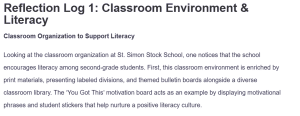Reflection Log 1: Classroom Environment & Literacy
Classroom Organization to Support Literacy
Looking at the classroom organization at St. Simon Stock School, one notices that the school encourages literacy among second-grade students. First, this classroom environment is enriched by print materials, presenting labeled divisions, and themed bulletin boards alongside a diverse classroom library. The ‘You Got This’ motivation board acts as an example by displaying motivational phrases and student stickers that help nurture a positive literacy culture.
What Works Well
An important factor that works particularly well is the availability of multilingual resources. English Language Learners (ELLs) and others benefit from the linguistic diversity showcased by the different English and Spanish books found in the classroom library. In addition, Souto-Manning and Martell (2016) indicate that creating inclusive environments requires the integration of student backgrounds into literacy practices. Students who are able to read in more than one language can create connections between their home languages and English, improving their sense of belonging.
Areas for Improvement
Despite the existing framework being commendable, there are areas where improvement is possible. Making hands-on learning more appealing for students may be doable with the aid of richer literacy stations that are interactive. Notably, Sanden et al. (2021) promote the value of generating energetic discussions about literary texts. Dividing spaces for collaborative reading and storytelling helps students bond better with their texts and join vital conversations with their peers.
Future Implementation
In my future classroom, it will be necessary to stress the importance of a literacy-rich, interactive atmosphere. I conceptualize setting flexible reading corners with comfortable seating and diverse reading resources, which lets students select texts that feel personally important to them. The objective is to ensure that literature circles happen on a routine basis that challenges students to talk about their texts in compact groups, improving their critical thinking abilities and conversation skills. This approach aligns with the strategies discussed in Souto-Manning and Martell (2016), particularly in Chapter 3, supporting a holistic literacy development framework that embraces diversity. Through this technique, I will find alignment with the approaches that support a broad literacy development framework that empowers student agency.
References
Sanden, S., Mattoon, C., & Osorio, S. L. (2021). Setting the stage for literature discussions. In Book Talk: Growing Into Early Literacy through Read-Aloud Conversations. Teachers College Press.
Souto-Manning, M., & Martell, J. (2016). Reading, writing, and talk: Inclusive teaching strategies for diverse learners, K–2. Teachers College Press.
ORDER A PLAGIARISM-FREE PAPER HERE
We’ll write everything from scratch
Question 
REFLECTION LOGS
While at your fieldwork site, take field notes on the following literacy-related topics so that you can use them to develop reflections for your Reflection Log entries using the guidelines below.
———————————————————————————————————————————
Reflection Log 1 Topic: (Classroom Environment & Literacy) Discuss how the classroom environment is organized to support literacy at your fieldwork site. Focus on specific examples. Then, answer the following questions using pertinent readings from session 4 to evaluate the extent to which the classroom environment is organized to support literacy:
- What do you notice works well? Explain why.
- What do you think could be added and/or done differently? Explain why.
- Reflect on how you would do this in your class or in the future. Be specific.

Reflection Log 1: Classroom Environment & Literacy
Notes:
- THE FEILDWORK SITE I AM USING IS ST. SIMON STOCK LOCATED IN THE BRONX, NY. I UPLOADED MY OTHER ASSIGNMENT THAT YOU GUYS DID FOR ME (57975) SO YOU CAN GET AN IDEA OF WHAT YOU CAN WRITE FOR THIS REFLECTION LOG OF THE CLASSROOM SETTING DO NOT COPY ANYTHING IN THE OLD ASSIGNMENT ITS JUST GET AN IDEA. ALSO, THE REFLECTION LOG HAS TO BE CONNECTED TO THE CLASS READINGS WHICH I UPLOADED TO THE ORDER.
- CLASS TEXTBOOK: Souto-Manning, M. & Martell, J. (2016). Reading, Writing, and Talk: Inclusive Teaching Strategies for Diverse Learners, K-2. Teachers College Press. (YOU ARE CONNECTING IT TO CHAPTER 3 IN THIS TEXT) THIS BOOK IS ON AMAZON IF YOU CAN’T GET ACCESS TO IT LET ME KNOW BUT THE REFLECTION NEEDS TO BE CONNECTED TO CHAPTER 3 IN THIS TEXT.
- THE SECOND READING IT NEEDS TO BE CONNECTED TO IS ATTACHED TO THE ORDER AS A PDF.